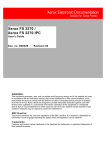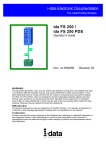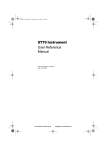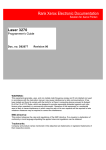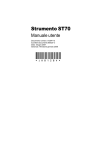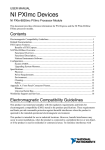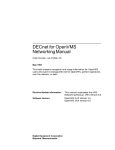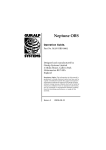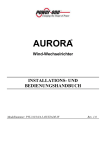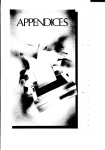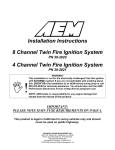Download Xerox TV Converter Box ls 32270 User's Manual
Transcript
Rank Xerox Electronic Documentation
Solution for Xerox Printers
0
Xerox LS 3270
User’s Guide
Doc. no D60322
Revision 01
WARNING:
This equipment generates, uses, and can radiate radio frequency energy and if not installed and used
in accordance with the instruction manual, may cause interference to radio communications. It has
been tested and found to comply with the limits for a Class A computing device pursuant to Subpart
B of Part 15 of FCC Rules, which are designed to provide reasonable protection against such interference when operated in a commercial environment. Operation of this equipment in a residential
area is likely to cause interference in which case the user at his own expense will be required to take
whatever measures may be required to correct the interference.
EMC directive:
This product observes the rules and regulations of the EMC directive. If so required, a declaration of
conformity in local language stipulating the applied rules and regulations can be obtained.
Trademarks:
Company and product names mentioned in this datasheet are trademarks or registered trademarks of
their respective owners.
Preface
Xerox LS 3270
Preface
September 1997
This manual applies to the Xerox LS 3270 protocol converter,
installed with firmware release S10 130.002, and to any subsequent release until otherwise specified.
The Xerox LS 3270 supports Coax and Centronics inputs. The
output is Centronics.
The manual describes how the Xerox LS 3270 is connected and
operated. Read it (and the Quick Guide provided with the product)
before you start using the protocol converter, and keep the manual
in a safe place for future reference.
It is assumed that the reader has a basic knowledge and understanding of IBM computer systems, especially the IBM 3270 Information Display System. It is also assumed that the reader has
adequate knowledge of the printer which is going to be connected
to the Xerox LS 3270.
The Xerox LS 3270 can be used with most ASCII printers .
Related Manuals:
"3270 Programmer's Guide", Document no. D62077.
The above manual describes how the Xerox LS 3270 is
tailored for a specific printer or application. Output drivers are
FSL or PCL which are selected via the front panel of the box
(See Chapter 1. for more details).
"IBM 3268 Printer Models 2 and 2C Description"
IBM Order No. GA27-3268
Contains information on the IBM 3268 printer which Xerox LS 3270
emulates.
-2-
Table of Contents
Xerox LS 3270
Table of Contents
Preface....................................................................................................... 2
Related Manuals: ................................ ................................ ... 2
Table of Contents...................................................................................... 3
1. Introduction to the Xerox LS 3270
....................................................... 4
1.1. What is the Xerox LS 3270? ................................ ...................... 4
1.1.1 PCL or FSL output driver ................................ .............. 4
1.2. Xerox LS 3270 Features ................................ ............................ 5
1.3 Supported Control Units ................................ ............................. 6
1.4. Installation Requirements ................................ .......................... 6
1.5 Paper Size Default (US/EU) ................................ ....................... 7
1.6. Operating Environment ................................ .............................. 7
2. Installation of the Xerox LS 3270
......................................................... 8
2.1. Knowing the Front Panel ................................ ........................... 8
2.2. Installation ................................ ................................ ................. 9
2.2.1 Pre-Installation Information ................................ ........... 9
2.2.2 Installation Procedure ................................ ................... 10
2.2.3 Automatic Power Supply Control ................................ .. 11
2.3. Testing ................................ ................................ ....................... 12
2.4. Timeout................................ ................................ ...................... 13
3. Operation of the Xerox LS 3270.......................................................... 14
3.1. Indicators of the Xerox LS 3270 ................................ ................ 14
CU (Contact with Control Unit) ................................ ............... 14
PAR (Parallel input) ................................ ............................... 14
4. Specifying Timeout............................................................................... 15
5. Programming the Xerox LS 3270....................................................... 17
5.1. Setup functions supported in PCL mode ................................ ... 18
5.2. Setup Functions supported in FSL mode ................................ .. 21
6. FSL Setup via Xerox LS 3270 Parallel Port
......................................... 24
6.1. Updating firmware ................................ ................................ ..... 26
7. Error Messages..................................................................................... 27
7.1. Recoverable Errors ................................ ................................ ... 27
7.2. Non-Recoverable Hardware Errors ................................ ........... 29
8. Test Printouts........................................................................................ 30
APPENDIX A. Quick Reference Guide to FSL Functions
....................... 33
APPENDIX B. Selected Xerox Products
................................................. 54
Index........................................................................................................... 55
-3-
Introduction
Xerox LS 3270
1. Introduction to the Xerox LS 3270
This chapter gives a short description of the Xerox LS 3270 and its
installation requirements.
1.1. What is the Xerox LS 3270?
The Xerox LS 3270 is a protocol converter which enables any
printer (or other output device) to be connected to an IBM
computer system.
The printer or device should have a Centronics parallel connector
in order to be con nected to the Xerox LS 3270 protocol converter.
The IBM system should use the 3270 type terminals. See Section
1.3, Supported Control Units, for information on the IBM systems to
which the Xerox LS 3270 connects.
1.1.1 PCL or FSL output driver
The output driver selection (rotary) switch on the front panel of the
box allows you to select between the following two drivers:
The PCL Driver (Default)
If you select PCL (set address switch to A), the box is ready to
operate as it is. When used with certain older IBM controllers, the
FSL function Y8 may have to be set to obtain the correct SCS
printer language. For further pro gramming of the box, you are
referred to the “3270 Programmer's Guide" Document no. D62077.
The FSL Driver
To use a non-PCL printer or connect to a serial input port on a
printer, you select FSL (set address switch to B). The Xerox LS
3270 is compatible with the Xerox 3270 C/RS box. For programming the internal setup of the box you must refer to the “3270
Programmer's Guide" Document no. D62077 .
-4-
Introduction
Xerox LS 3270
Changing the Driver
To change from PCL to FSL driver or vice versa, first of all the
rotary switch has to be in position T at power on. The current
printer driver will be indicated on a printout. The actual selection of
printer driver is then made by turning the rotary switch to position A
(PCL) or B (FSL). The new position will also be indicated on a
second printout. When the correct position is obtained, turn the
rotary switch away from the A, B or T positions (any other position
will do). The new driver is now active.
1.2. Xerox LS 3270 Features
The Xerox LS 3270 protocol converter gives you the following features:
•
IBM 3287, 32681 and 4214 emulations
• Support of the SCS (LU1) and 3270 data stream (LU0 or
LU3) modes including FMH data streams as required by
the host system.
• All IBM RPQs
• Parallel output in PCL mode
• Up to 8 user strings of variable length can be transmit ted
to the printer from the Xerox LS 3270 - automatically at
power on and before and after Local Copy from the host
system.
• Automatic input sharing between Coax and Centronics
input ports.
• Coax FSL setup via share port
• Flash prom allowing downloading of new firmware via the
coax or the centronics port.
• Support of ida PSS
• Autoconfiguration (PCL only)
13268
= factory default
-5-
Introduction
Xerox LS 3270
1.3 Supported Control Units
The Xerox LS 3270 connects to the following control units:
•
IBM 3174
All models
•
IBM 3274
All models (A-adapter)
•
IBM 3276
All models
•
IBM 4321/31/41/61
All models
•
IBM 81XX
Via 327x controllers or 8775
terminals
•
IBM 4701/4702
Through the Device Cluster
Adapter
•
IBM 8775
Through 3287 attachment
RPQ
All equivalent 3274/76 PCM controllers, subject to valida tion by
your dealer. Contact your dealer for more information.
1.4. Installation Requirements
Please first check that you have received the following items:
•
•
•
Xerox LS 3270 Converter
Xerox LS 3270, Quick Guide; Doc. no. D10322
Xerox LS 3270, User’s Guide; Doc. no. D60322
In addition, the following i-data accessories can be used:
•
Extension Centronics cable
Order no. 999 020 030
•
5V external power supply:
Order no. 999 021 130 for EU
Order no. 999 021 230 for UK
Order no. 999 021 330 for US
-6-
Introduction
Xerox LS 3270
1.5 Paper Size Default (US/EU)
When you receive the Xerox LS 3270, the box is ready to connect
to the system and to the printer. From the factory, the Xerox LS
3270 interface is set up for either US (Letter) or European (A4)
paper size (depending on what you specified when ordering the
Xerox LS 3270). If, however, you should need to change the
default, you may do this by using the FSL function Y8 (see
Appendix A for details).
1.6. Operating Environment
The Xerox LS 3270 protocol converter can be installed in the
following environment :
•
•
•
Works in the complete temperature range specified for
the connected printer if not exceeding 45° Centigrade
Relative humidity between 8% to 80%, non-condensing
External power supply: 5V (250 mAmps).
-7-
Installation
Xerox LS 3270
2. Installation of the Xerox LS 3270
This chapter starts with an overview of the functionality of the front
panel. Then follows a description of how you connect the Xerox LS
3270 box to a printer.
NOTE:
Before you start the installation, make sure that the
rotary switch is set to the required emulation (PCL is
default). See the location of the switch in section
2.1. below.
2.1. Knowing the Front Panel
PAR
Centronics Ouput Port
CU
B
T
A
TEST
External Power Supply
Connector
Coax Port
Rotary Switch
Centronics Share Port
Fig 2-1 Xerox LS 3270 Front Panel
COAX
The coax cable is connected to the host which communicates in
accordance with the 3270 protocol.
PARALLEL/CENTRONICS OUT
The parallel/Centronics output port is connected to the
parallel/Centronics in put port on the target printer.
-8-
Installation
Xerox LS 3270
ROTARY SWITCH
The rotary switch is used for changing the output driver (PCL or
FSL) and for generating a TEST print. See the section 1.1.1, PCL
or FSL output Driver for information on changing the driver and the
section 2.3, Testing for information on making a TEST printout.
PARALLEL/MINI-CENTRONICS IN
The parallel/mini-Centronics input port can be connected to the
parallel/Centronics out put on a PC or similar source able to share
the printer with the host.
2.2. Installation
CAUTION:
All connections to theXerox LS 3270 protocol converter
should be made while the power is switched OFF.
2.2.1 Pre-Installation Information
Printer Dependency:
An external power supply may be needed for the Xerox LS 3270 if
the printer does not have 5V on pin 18 on the Centronics input
port.
This can be verified at the time of installation in the following way:
An external power supply is needed:
• if the PAR and CU LEDs do not turn ON when the printer is
powered ON with the Xerox LS 3270 installed, and
• if no print is generated when making a TEST printout (see
section 2.3, Testing for details.
-9-
Installation
Xerox LS 3270
Printer Cable:
The Xerox LS 3270 does not necessarily have to be plugged
directly into the Centronics Input Port of your printer. An extention
Centronics cable can be ordered for distance connection between
the Xerox LS 3270 and your printer. This kit also contains a velcro
tape to enable mounting on the side of a printer.
Order no. 999 020 030
2.2.2 Installation Procedure
Below follows the procedure for installing the Xerox LS 3270:
1.
Make sure the printer power is turned OFF.
2.
Plug the Centronics Output Port of the Xerox LS 3270 into
the Centronics Input port of the printer and lock it with the
bail locks.
3.
Check that the rotary switch on the Xerox LS 3270 is in the
correct position for the printer driver needed:
Position A for PCL (default)
Position B for FSL
If you need to make changes to the printer driver, see
section 1.1.1, PCL or FSL output Driver, “Changing the
Driver”, for details on how to do this.
4.
Connect the coax cable to the Xerox LS 3270.
5.
Power ON the printer. The CU and PAR LEDs of the Xerox
LS 3270 will turn on if the power is sufficient (for location of
CU and PAR LEDs, see figure 2-1 in Section 2.1 Knowing
the Front Panel).
6.
Check power and signal connection. If po wer is sufficient
and a coax connection exists between the Xerox LS 3270
and a controller, the green CU LED will stay ON. If the CU
and PAR LEDs were not turned on at power on, you must
add an external power supply to the Xerox LS 3270.
5.
Send a job from the host system and check the printout.
Note that the system printer emulation must match the
Xerox LS 3270 printer driver. If not, change the printer driver
- 10 -
Installation
Xerox LS 3270
using the rotary switch (see section 1.1.1, PCL or FSL
output Driver for details).
2.2.3 Automatic Power Supply Control
The Xerox LS 3270 will perform a power supply control to see if
there is sufficient power on the unit.
Section 2.2.1, “ Pre-Installation Information” describes how to
recognize whether a 5V external power supply is needed in order
to make the Xerox LS 3270 work.
The 5V power supply can be ordered, using the below order
numbers:
Order no. 999 021 130 for EU
Order no. 999 021 230 for UK
Order no. 999 021 330 for US
The transformer is connected to the plug on the box's side panel
as indicated in Fig. 2-3 in the following.
B
T
A
TEST
External Power Supply
Connector
Fig. 2-3 The Xerox LS 3270 and its side panel
- 11 -
Installation
Xerox LS 3270
2.3. Testing
PCL driver:
The default configuration of the interface will suffice for
most application programs and uses. You should only
change the configuration shown in the test printout if you
have special requirements.
If you should wish to change the configuration, the options
may be set from the line as described in the Programmer's
Guide; document no. D62077 (see "Related Manuals").
FSL Driver
With the FSL driver you have selected an unprogrammed
printer driver. You have to program the internal setup of the
box to suit your printing requirements. See Programmer's
Guide; document no. D62077 for further details.
1.
Power the unit ON.
2.
Turn the rotary switch to the “T” position and back to the
original position. This will generate a settings printout.
3.
When the switch has been turned back to its original position,
the CU indicator will start flashing for approximately 30
seconds.
4
Turn the rotary switch to the “T” position once again while the
CU indicator is flashing. The unit will now enter Online HEX
dump mode. The dump mode is terminated by turning the
switch away from and back into the “T” position.
NOTE:
The CU indicator will be blinking rapidly while the
rotary switch is in the “T” position. This is an
indication that the “T” position is not a valid
permanent position.
5.
Compare the settings printout (FSL or PCL printout) with the
printout illustrated in C hapter 8, Test Printouts.
- 12 -
Installation
Xerox LS 3270
Keep the settings printout together with this manual
for future reference.
Settings Printout using FSL Y120 (PCL mode only)
A settings printout can also be generated at power-on by activating
function Y120 2.
2.4. Timeout
The Xerox LS 3270 enables printer sharing between the system
and a PC. For this purpose it is possible to specify a timeout
period.
If the printer is receiving input on the parallel port, for example,
and there is a break in the transmission of data, the other input
ports will not be polled for the period speci fied.
The factory default timeout is 20 seconds. The timeout may be
changed to suit your requirements. This is done by sending a new
setup to the Xerox LS 3270 input port where you want it to take
effect. See Chapter 4. Specifying Timeout.
When specifying the timeout it is also possible to specify a user
string. A user string may be used for changing from one symbol set
(e.g. Roman 8) to another (e.g. IBM -PC8), for example.
NOTE:
Settings on the coax input port are automatically
reestablished after another input port has been
using the printer.
On the parallel input port, you have to program the
required setup yourself.
For more detailed information on the commands required, see
Chapter 5, Specifying Timeout.
2For
details on how to define the ESC character %, please see Chapter 5.
- 13 -
Operation
Xerox LS 3270
3. Operation of the Xerox LS 3270
The Xerox LS 3270 top panel has been designed to register the
operation of the box via the following indicator LEDs :
•
CU (contact to Control Unit)
•
PAR (parallel input)
See the illustration in the section Knowing the Front Panel for the
position of the LEDs.
3.1. Indicators of the Xerox LS 3270
CU (Contact with Control Unit)
This indicator LED has 3 states:
State
ON
BLINKING
OFF
Indication
Contact with the control unit.
1. Contact with the control unit, and data pending
in the Xerox LS 3270 buffer.
2. Indicates that the address switch has been
activated and the box is ready to enter on-line
HEX dump mode
No contact to the control unit, or the contact has
been broken for more than 1 minute.
PAR (Parallel input)
The indicator LED has 2 states:
State
ON
OFF
Indication
Indicates that the box is processing data from the
Centronics parallel port
Indicates that the box is idle or processing data
from the coax input
- 14 -
Specifying Timeout
Xerox LS 3270
4. Specifying Timeout
In order to specify the timeout for a specific input port, an FSL
(Function Selection via the Line) sequence must be sent to the
port in question. To do this a tempo rary Escape (ESC) Character
must be defined first. This is done in the following way:
&&??<character>
The sequence "&&??%" will define "%" as the ESC Character.
Timeout is specified in FSL Function 100 . This function has the
following syntax ("%" is the ESC Character):
%Y100,<timeout>[,user string]%
Factory default = 20 seconds
Timeout:
0 to 255 indicating number of seconds
User string:
Optional - string in HEX to be sent to the
printer before transmission of data,
when the printer is selected by the
share unit.
If function 100 is sent to the coax, a
user string number can be defined
instead of a HEX string. The user string
then has to be defined in function 61.
NOTE:
The Timeout string must be written in ONE line (see
example overleaf).
The user string and settings will only be sent if a share condition
has occurred.
- 15 -
Specifying Timeout
Xerox LS 3270
The new setup must be saved in the NVRAM 3 with the following
command ("%" is the ESC Character):
%X1
The FSL string above was split up into several lines for reasons of
clarification to simplify the explanation of the different functions.
Below is an example where the FSL string is typed in one line.
Example:
&&??%%Y100,30,1B,45%%X1
The FSL string above has the following effect:
•
•
•
•
Defines % as ESC character
Sets timeout to 30 seconds
Send 1B 45 HEX before the next data transmission.
Saves setup in the NVRAM.
NOTE:
FSL Y100 works on the port it is sent to. If it is sent
to the parallel input port, the string containing the
Function Y100 programming will be printed when it
is sent to theXerox LS 3270. See Chapter 6, FSL
Setup via Xerox LS 3270 Parallel Port
3NVRAM
= Non-volatile RAM
- 16 -
Programming the Xerox LS 3270
Xerox LS 3270
5. Programming theXerox LS 3270
The Xerox LS 3270 supports approximately 60 internal Setup
Functions (FSL Functions) 4. When the protocol converter has been
installed and connected to a printer, you may have to consider the
use of these setup options.
FSL setup functions can be sent either from your IBM system or
from a PC.
PCL Driver (Default)
If you have decided to run the Xerox LS 3270 in PCL mode (see
Chapter 1), the Xerox LS 3270 is ready to operate after you have
completed the installation procedure. The factory default setup will
meet the demands of most host systems and users, and special
programming is therefore normally not required.
However, special circumstances may require changes in the
programming of the box. For full details on this please see the "
3270 Programmer's Guide" Document no. D62077. In the
Programmer's Guide you will find an extensive description of the
FSL Functions with notes, comments and examples.
FSL Driver
If you have decided to run the Xerox LS 3270 in FSL mode (see
Chapter 1), you have just selected an unprogrammed printer driver
and you need to program any further settings of the box using FSL
functions. The " 3270 Programmer's Guide" Document no.
D62077, gives you full details on how you do this.
On the following pages you will find a list of the
functions available in PCL mode and FSL mode
respectively.
4FSL
= Function Selection via the Line
- 17 -
Programming the Xerox LS 3270
Xerox LS 3270
5.1. Setup functions supported in PCL mode
Y1
Y2
Y3
Y4
Y5
Y6
Y7
Y8
Y10
Y11
Y12
Y13
Y14
Y19
Y22
Y25
Y26
Y27
Y28
Y29
Y30
Y31
Y32
Y33
Y34
Y36
Y37
Y38
Y41
Y44
Y46
Y47
Y48
Y49
Y50
Y51
Y57
Y58
Y59
Y60
Y61
Y62
Y63
Y72
Y73
Set IBM Buffer Size
Set Default LPI
Set Default CPI
Set Default Line Spacing
Set Default Page Length (MPL)
Set Default Max. Print Position (MPP)
Set Case (Mono,Dual)
Set LU1 Language
Set Page Format
Set Default Paper Path
Set Default Paper Size
Line Overflow Condition
Enable Graphics Option (idaAFP)
Set Simplex/Duplex
Printer Driver Selection
FF Before Local Copy
FF After Local Copy
NON-SCS Print Image
NON-SCS, CR at MPP+1
NON-SCS, NL at MPP+1
NON-SCS, Valid FF Followed by data
NON-SCS, Valid FF at end of buffer
NON-SCS, FF Valid
NON-SCS, Automatic Func. at end of job
Last LF on page sent as FF
Suppress IBM control codes (parameters 0 and 1)
IBM Printer Emulation Select (parameters 0,1,2 & 4)
IBM Communication Feature (Query, EAB)
Generation of NL at EM
Suppress CR and SP
Set IRQ Timer
ESC Mode Selection
Set Permanent ESC Character
Restrict access of NVRAM settings
FF After Time Elapse
User-defined string(s) at Power-on
User-defined string before local copy
User-defined string after local copy
Bar Code Type Definition
Font Link
Setup for user-defined strings (parameters 0 - 7)
Setup for IBM defined strings
Define Logo
Reset Translate Table
Select Translate Table
- 18 -
Programming the Xerox LS 3270
Xerox LS 3270
Y74
Y75
Y77
Y78
Y79
Y80
Y88
Y89
Y90
Y91
Y92
Y93
Y94
Y96
Y98
Y100
Y110
Y111
Y112
Y113
Y114
Y115
Y119
Y120
Printer Symbol Set Definition Strings
Overwrite Translate Table
Reset APL Translate Table
Select APL Translate Table
ida 820 AFP Font Offset
Overwrite APL Translate Table
Margin Definition
Enable Margin Definition
Define User Escape String
Font Definiti on
Font Point Size Definition Strings
Font Attribute Definition
Font Typeface Definition
Font Change Simulation
Automatic Page Orientation
Port Sharing Option
idaAFP Orientation Support
idaAFP Duplex Support
idaAFP PCL5 Font Support
idaAFP Early Print Complete
idaAFP Colour Support
idaAFP Miscellaneous
Autoconfiguration Select
Print Test Page at power on
ESC Features:
%%
Special transparent feature (Multiple paired Hex
transparent).
e.g.: %%1B45%
where % is the defined ESC character.
%
Special transparent feature (Single paired Hex
transparent).
where % is the defined ESC character.
Send Logo:
L
Send logo (Logo is defined in Y63).
- 19 -
Programming the Xerox LS 3270
Xerox LS 3270
TEST functions (T-Functions):
T1
T2
T3
T4
T5
T6
Offline Hex Dump (PCIA Dump)
Online Hex Dump
Online ASCII Hex Dump
Print out Settings
Printout Character Set
Cancel Online ASCII Hex Dump
User Settings Functions (X-Functions):
X1
X2
X3
X4
X5
Store Settings in Permanent Storage
Restore Settings from Permanent Storage
Restore Factory Default Settings
Restore Settings from Permanent Storage
Restore Settings (SCS settings will be retained)
Engineering Functions:
Y249
Enable Engineering Mode
Z Functions:
Zn
Send user-defined string
W Functions:
Wn
Printing Barcodes (defined in Y 59)
- 20 -
Programming the Xerox LS 3270
Xerox LS 3270
5.2. Setup Functions supported in FSL mode
Y1
Y2
Y3
Y5
Y6
Y7
Y8
Y9
Y11
Y14
Y25
Y26
Y27
Y28
Y29
Y30
Y31
Y32
Y33
Y34
Y35
Y36
Y37
Y38
Y39
Y44
Y46
Y48
Y49
Y50
Y51
Y52
Y53
Y54
Y55
Y56
Y57
Y58
Y61
Y62
Y63
Y71
Y72
Set IBM Buffer Size (parameters 2,3,4 & 5)
Set Default LPI (parameters 6 & 8)
Set Default CPI (parameters: 10, 12, 15 & 16)
Set Default Page Length (MPL)
Set Default Max. Print Position (MPP)
Set Case (Mono,Dual)
Set LU1 Language
Set Default Print Quality (parameters 2 & 3)
Set Default Paper Path (parameters 1, 2 & 3)
Enable Graphics Option (idaAFP) (parameters 0 & 1)
FF Before Local Copy
FF After Local Copy
NON-SCS Print Image
NON-SCS, CR at MPP+1
NON-SCS, NL at MPP+1
NON-SCS, Valid FF Followed by data
NON-SCS, Valid FF at end of buffer
NON-SCS, FF Valid
NON-SCS, Automatic Func. at end of job
Last LF on page sent as FF
FF from system sent as FF or LF's
Suppress IBM control codes
IBM Printer Emulation Select
IBM Communication Feature (Query, EAB)
Suppress Empty Forms
Suppress CR and SP
Set IRQ Timer
Set Permanent ESC Character
Restrict access of EEPROM settings
FF After Time Elapse
User-defined string(s) at Power-on
User-defined string(s) at Printer Power down/ Printer
Error
User-defined string before Error M essage
User-defined string after Error Message
Barcode type select
Barcode Entry
User-defined string before local copy
User-defined string after local copy
Setup for user-defined strings
Setup for IBM defined strings
Define Logo
Create Translate Table
Reset Translate Table
- 21 -
Programming the Xerox LS 3270
Xerox LS 3270
Y73
Y75
Y76
Y77
Y78
Y80
Y88
Y89
Y90
Y100
Y120
Select Translate Table
Overwrite Translate Table
Create APL Translate Table
Reset APL Translate Table
Select APL Translate Table
Overwrite APL Translate Table
Margin Definition (idaAFP only)
Enable Margin Definition
Define User Escape String
Port Sharing Option
Settings Printout at Power Up
ESC Features
%%
Special transparent feature (Multiple paired Hex
transparent).
e.g.: %%1B45%
where % is the defined ESC character.
%
Special transparent feature (Single paired Hex
transparent).
where % is the defined ESC character.
Send Logo:
L
Send logo (Logo is defined in Y63).
TEST functions (T-Functions):
T1
T2
T3
T4
T5
T6
Offline Hex Dump (PCIA Dump)
Online Hex Dump
Online ASCII Hex Dump
Print out Settings
Printout Character Set
Cancel Online ASCII Hex Dump
- 22 -
Programming the Xerox LS 3270
Xerox LS 3270
User Settings Functions (X-Functions):
X1
X2
X3
X4
Store Settings in Permanent Storage
Restore Settings from Permanent Storage
Restore Factory Default Settings
Restore Settings from Permanent Storage
Engineering Functions:
Y249
Enable Engineering Mode
Z Functions:
Zn
Send user-defined string
- 23 -
FSL Setup via Xerox LS 3270 Parallel Port
Xerox LS 3270
6. FSL Setup via Xerox LS 3270 Parallel
Port
FSL support on the parallel input port is defined by temporary
escape character, FSL Y100 and ESC X1.
The Engineering Function Y249 (FSL setup via share port) allows
you to program the FSL parameters for coax input directly via the
parallel input port.
When FSL programming is preceded by FSL Y249, the Xerox LS
3270 will interpret the FSL as sent via the coax line.
Example:
&&??%%Y100,10,’SHARESTRING’%%X1
Sent to the parallel input port, this command string will program
FSL Y100 on the parallel input port it was sent to.
&&??%%Y249,PASSWORD%%Y100,10,’SHARESTRING’%%X1
Sent to the parallel input port, this command string will program
FSL Y100 on the coax port.
In the description below, it is assumed that you know how to define
an escape character (this must be done before you can use the
Y249 function).
Character conversion
When the engineering function is received all the following
characters in the Xerox LS 3270 are converted to LU3 characters.
The characters are now interpreted as received by the coax line.
This functionality is automatically deactivated after timeout on the
share port used.
- 24 -
FSL Setup via Xerox LS 3270 Parallel Port
Xerox LS 3270
NOTE:
To ensure correct conversion of the characters
following the engineering function, use characters
existing in the symbol set PC-850 for Coax.
Activating the Y249 Engineering Function
Before the Engineering Function can be activated, an Escape
character must be defined (see chapter 5 for details on how to do
this).
If you have defined % as Escape CHARACTER, you activate the
engineering function by typing:
%Y249,n%
n = password. As this is sensitive information, system operators
can contact their i-data distributor for password details.
Deactivating the Y249 Engineering Function
The function will be deactivated automatically after timeout on the
share port used (timeout is defined in Y100 Port Sharing Option).
Limitations when Y249 is active
Characters not present in the PC-850 symbot set (Coax) can still
be sent in hex notation.
Example:
If you need to define user string 1 containing a PCL reset, then
define the following:
&&??%
%Y249,PASSWORD%
%Y61,1,1B45%
%X1
- 25 -
FSL Setup via Xerox LS 3270 Parallel Port
Xerox LS 3270
6.1. Updating firmware
The Xerox LS 3270 firmware (complete firmware) may be updated
either via the coax line or via the centronics input port. For further
information please contact your distributor.
If errors are detected, the downloading will be terminated and an
error message will be printed if possible. If serious errors occur
during programming, the firmware has to be downloaded via the
share port.
The downloading of firmware is considered complete if no data is
received within 30 seconds. The interface will then make a soft reset.
- 26 -
Error Messages
Xerox LS 3270
7. Error Messages
Errors fall into two categories: the operator-recoverable errors and
the non-recoverable hardware errors.
The error messages listed below are all printed out on paper when
the error situation arises (provided the printer is on-line).
You correct the errors from the host system in accordance with the
error messages given.
7.1. Recoverable Errors
The error messages are listed in alphabetical order below.
BARCODE IS DISABLED
ESCAPE SEQUENCE ERROR
NOT NUMBER
ESC X IS WRONG
ESCAPE SEQUENCE ERROR
ESCAPE SEQUENCE ERROR
NUMERICAL OVERFLOW
ESCAPE SEQUENCE ERROR
CREATE TRANSLATE TABLE
OUT OF RANGE. MAX 8' 13
ESCAPE SEQUENCE ERROR
NO TRANSLATE TABLE
CREATED
ESCAPE SEQUENCE ERROR
NO TRANSLATE TABLE
APL
CREATED
- 27 -
Error Messages
Xerox LS 3270
ESCAPE SEQUENCE ERROR
TRANSLATE TABLE LOAD
CHARACTER IS OUT OF RANGE
VALIDATION VALUE IN FLASH PROM IS WRONG
VALUES ARE NOW OVERWRITTEN WITH FACTORY
DEFAULTS
ESCAPE SEQUENCE ERROR
ILLEGAL SEPARATOR
FUNCTION (NO) IS NOT SUPPORTED
ESCAPE SEQUENCE ERROR
ESC Y
MULTISTRIKE STRING IS TOO LONG
Not in engineering mode
FLASH PROM VERIFICATION ERROR IN CELL
PARAMETER IS OUT OF RANGE
PASSWORD IS NOT ACTIVE
SYNTAX ERROR IN CALL. FUNC = (NO)
THE CONTENTS OF FLASH PROM HAS BEEN DAMAGED
VALUES ARE NOW OVERWRITTEN WITH FACTORY
DEFAULTS
There is no password
THE FLASH PROM IS ALREADY LOCKED, PASSWORD IS
IGNORED
THE PASSWORD TO OPEN NVRAM AREA IS WRONG
THE PASSWORD IS TOO LONG
THE SELECTED BARCODE IS NOT SUPPORTED
The FLASH PROM is locked
The dynamic area is locked
The checksum in the FLASH PROM is wrong
THERE IS NO SPACE LEFT
IN THE DYNAMIC AREA
- 28 -
Error Messages
Xerox LS 3270
THE USER ADDRESS STRING IS TOO LONG
TERMINATOR NOT ACCEPTED
ESC Z IS WRONG
Validation value in FLASH PROM is wrong
YOU CANNOT LOCK THE FLASH PROM
BEFORE YOU HAVE PROGRAMMED IT
7.2. Non-Recoverable Hardware Errors
The following recovery attempt can be made:
•
Turn power OFF for 10 seconds and then ON again. If
the problem persists, seek technical assistance.
The non-recoverabel error messages consist of this message:
HARDWARE MALFUNCTION. Call for service.
followed by one of these diagnostic messages:
COAX IF ram error
Wrong data in selftest
Wrong word in selftest
Nothing received in selftest
8085 ram error
Rom check sum error
Response missing from COAX IF
Invalid test response from COAX IF
- 29 -
Test Printouts
Xerox LS 3270
8. Test Printouts
PCL Test Printout
Xerox LS 3270 PCL, Version: S10 130.002 /00884004
Boot ID: 80051002
Escape code = 00 Hex, Character = ' '.
There are 2048 bytes available in the dynamic area.
299 bytes are in use, and 1749 bytes are free.
Function
Function
Function
Function
Function
Function
Function
Function
Function
Function
Function
Function
Function
Function
Function
Function
Function
Function
Function
Function
Function
Function
Function
Function
Function
Function
Function
Function
Function
Function
Function
Function
Function
Function
Function
Function
Function
Function
Function
Function
Function
Function
Function
Function
Function
Function
1:
2:
3:
5:
6:
7:
8:
10:
11:
12:
13:
14:
19:
22:
25:
26:
27:
28:
29:
30:
31:
32:
33:
34:
36:
37:
38:
41:
44:
46:
47:
49:
50:
73:
78:
79:
89:
98:
110:
111:
112:
113:
114:
115:
119:
120:
is
is
is
is
is
is
is
is
is
is
is
is
is
is
is
is
is
is
is
is
is
is
is
is
is
is
is
is
is
is
is
is
is
is
is
is
is
is
is
is
is
is
is
is
is
is
set
set
set
set
set
set
set
set
set
set
set
set
set
set
set
set
set
set
set
set
set
set
set
set
set
set
set
set
set
set
set
set
set
set
set
set
set
set
set
set
set
set
set
set
set
set
to
4
to
6
to 10
to 66
to 132
to
1
to
0
to
0
to
2
to
1
to
1
to
1
to
0
to
5
to
0
to
1
to
0
to
0
to
0
to
1
to
1
to
0
to
0
to
1
to
0
to
1
to
1
to
1
to
1
to 12
to
1
to
0
to
0
to
0
to
1
to
0
to
0
to
1
to
1
to
0
to
0
to
1
to
0
to
1
to
0
to
0
BUSY TIMEOUT: 240
TIMEOUT COAX, 20
TIMEOUT CENTRONICS: 20
Default GFID:
10 CPI = 11
, 13 CPI = 204
- 30 -
Test Printouts
Xerox LS 3270
12 CPI = 80
15 CPI = 223
16 CPI = 253
, 20 CPI = 281,
, 27 CPI = 290
PROPORTIONAL SPACED = 1412
ACTIVE GFID = 11
AFP TOP MARG. = 0 : 0
AFP LEFT MARG. = 0 : 0
USER STRING #6 = 1B,26,6C,30,4F
USER STRING #7 = 1B,45
IBM Setup String(s):
130
1B,28,73,33,42
131
1B,28,73,30,42
BARCODES: 39,3,2;29,3,2;28,3,2;26,3,2;35,3,2;24,3,2;33,3,2;22,3,2
- 31 -
Test Printouts
Xerox LS 3270
FSL Test Printout
Xerox LS 3270 FSL, Version: S10 130.002/00884004
Boot ID: 80051002
Escape code = 00 Hex, Character = ' '.
There are 2048 bytes available in the dynamic area.
299 bytes are in use, and 1749 bytes are free.
Function
Function
Function
Function
Function
Function
Function
Function
Function
Function
Function
Function
Function
Function
Function
Function
Function
Function
Function
Function
Function
Function
Function
Function
Function
Function
Function
Function
Function
Function
Function
Function
Function
Function
Function
1:
2:
3:
4:
5:
6:
7:
8:
9:
11:
14:
25:
26:
27:
28:
29:
30:
31:
32:
33:
34:
35:
36:
37:
38:
39:
44:
46:
47:
49:
50:
55:
89:
100:
120:
is
is
is
is
is
is
is
is
is
is
is
is
is
is
is
is
is
is
is
is
is
is
is
is
is
is
is
is
is
is
is
is
is
is
is
set
set
set
set
set
set
set
set
set
set
set
set
set
set
set
set
set
set
set
set
set
set
set
set
set
set
set
set
set
set
set
set
set
set
set
to
4
to
6
to 10
to
1
to 72
to 132
to
1
to
1
to
1
to
1
to
0
to
0
to
0
to
0
to
0
to
0
to
0
to
0
to
0
to
0
to
0
to
0
to
0
to
1
to
1
to
0
to
0
to 12
to
1
to
0
to
0
to
1
to
0
to 20
to
0
BUSY TIMEOUT: 240
TIMEOUT COAX, Centronics: 20,20
No
No
No
No
No
No
user
user
user
user
user
user
strings
strings
strings
strings
strings
strings
are
are
are
are
are
are
sent
sent
sent
sent
sent
sent
at power on.
after printer error.
at user programming error.
after user programming error.
before local copy.
after local copy.
Password is not activated.
- 32 -
Appendix A
Xerox LS 3270
APPENDIX A. Quick Reference
Guide to FSL Functions
* = Factory Default
** = Factory Default (US)
No.
1
Name
Buffer Size
Syntax
%Y1,<n1>%
2
LPI
%Y2,<n1>%
3
CPI
Line Spacing
%Y4,<n1>%
5
Form Length
%Y5,<n1>%
Maximum
Print
Position
For an explanation of
USER and AUTO modes,
see the "3270 Programmer's Guide"
0 = USER: No CPI
AUTO: Prop.
spacing
*10 = 10 CPI
12 = 12 CPI
15 = 15 CPI
16 = 16.7 CPI
20 = 20 CPI
27 = 27 CPI
*1 = Single Space
2 = Double space
0 = Disable vertical
formatting
001
to
255 = Set FL in no.
of lines
%Y3,<n1>%
4
6
Parameters
1 = 960 characters
2 = 1920 characters
3 = 2560 characters
*4 = 3440 characters
5 = 3564 characters
0 = USER: No LPI
AUTO: Ignored
3 = 3 LPI
4 = 4 LPI
*6 = 6 LPI
8 = 8 LPI
%Y6,<n1>%
0
= No NLs will be
generated by the
interface
001
to
255 = Set MPP in no.
of characters
7
Case
*132
0 = Mono case (left
to right)
*1 = Dual case (left
to right)
2 = Right to left
(dual case)
3 = Left to right
(dual case)
%Y7,<n1>%
- 33 -
Deviations
FSL: N/S
FSL: N/S
FSL: N/S
FSL: N/S
FSL: N/S
FSL: N/S
FSL: N/S
Y4:
PCL only
*72=FSL
*66=PCL
**66=FSL
**62=PCL
Appendix A
Xerox LS 3270
No.
8
9
Name
LU1 Language
Print
Quality
Syntax
%Y8,<n1>%
Parameters
*0 = Download LU1
language from
CU
1 = English US
EBCDIC
3 = Austrian/
German
4 = Belgian
5 = Brazilian
6 = Canadian
(French)
7 = Danish/
Norwegian
8 = Danish/
Norwegian Alt
9 = Finnish/
Swedish
10 = Finnish/
Swedish Alt
11 = French
13 = Austrian/
German Alt
14 = International
15 = Italian
16 = Japanese
(English)
19 = Spanish
20 = Spanish Alt
21 = Spanish speaking
22 = English UK
28 = Portuguese
30 = French
105-charact.
31 = Swiss German/
French
40 = Spanish Data/
Text
*1 = Draft Print
Quality
2 = Near Letter
Quality
3 = Correspondence
%Y9,<n1>%
- 34 -
Deviations
*0=PCL
*1=FSL
Y9:
FSL only
Appendix A
Xerox LS 3270
No.
10
11
Name
Page Format
Paper Path
Syntax
%Y10,<n1>[,n2]%
%Y11,<n1>[,n2]%
Parameters
n1
*0 = Portrait
1 = Landscape
2 = COR 1
3 = Fit to page in
portrait
4 = 8" x 11"
Portrait
5 = 8" x 12"
Portrait
6 = 13.2" x 8.5"
Landscape
7 = Landscape
13.2"
8 = Portrait
10 cpi x 11"
9 = Portrait
10 cpi z 12"
n2
1 =
2 =
3 =
4 =
5 =
6 =
n1
0 =
Tractor (Upper)
Drawer 1 (Upper)
Drawer 2 (Lower)
Manual feeder
Envelope feeder
Drawer 3 (Lower)
Ignore PPM and
select tray
from printer
front panel
= Tractor (Upper)
= Drawer 1
= Drawer 2
= Manual feeder
= Envelope feeder
= Drawer 3
= Drawer 4
1
2
3
4
5
6
7
n2
0 = No destination
drawer selected
Destination
drawer will be
defined by
printer’s
settings.
1 = Destination 1
2 = Destination 2
3 = Destination 3
4 = Destination 4
5 = Destination 5
6 = Destination 6
7-255 Reserved for
future use.
- 35 -
Deviations
Y10:
PCL only
FSL: N/S
*1=FSL
*2=PCL
FSL:
FSL:
FSL:
FSL:
N/S
N/S
N/S
N/S
Appendix A
Xerox LS 3270
No.
12
Name
Paper Size
Syntax
%Y12,<n1>[,n2]%
Parameters
n1
*1 = A4
2 = Legal
**3 = Letter
4 = Executive
5 = Letter
(Monarch)
6 = Business
(Com 10)
7 = International
DL
8 = International
C5
10 = A3
n2
1 =
2 =
3 =
4 =
5 =
6 =
- 36 -
Tractor (Upper)
Drawer 1 (Upper)
Drawer 2 (Lower)
Manual feeder
Envelope feeder
Drawer 3 (Lower)
Deviations
Y12:
PCL only
Appendix A
Xerox LS 3270
No.
13
14
Name
Line
Overflow
Option
Enable
Graphics
Syntax
%Y13,<n1>[,n2]%
Duplex
Printing
%Y19,<n1>%
22
Printer
Driver
Selection
%Y22,<n1>%
25
FF before
Local Copy
n2
1 = Tractor (Upper)
2 = Drawer 1 (Upper)
3 = Drawer 2 (Lower)
4 = Manual feeder
5 = Envelope feeder
6 = Drawer 3 (Lower)
0 =Disable graphics
1 =Enable graphics
2 =Disable graphics
(and no error detection at mode
changes)
3 =Enable graphics
(and no error detection at mode
changes)
%Y14,<n1>%
19
Parameters
n1
0 = Lines longer
than print line
are wrapped.
Overflow data
on next line.
*1 = Lines longer
than print line
are cut.
Overflow data
is not printed.
*0
1
2
*5
=
=
=
=
Simplex
Long-edge duplex
Short-edge duplex
PCL 5 driver.
Disable ida AFP
query.
15 = PCL 5E driver
Enable ida AFP
query.
*0 = No FF
1 = FF
%Y25,<n1>%
- 37 -
Deviations
Y13:
PCL only
*0=FSL
*1=PCL
FSL: N/S
FSL: N/S
Y19:
PCL only
Y22:
PCL only
Appendix A
Xerox LS 3270
No.
26
27
28
Name
FF after
Local Copy
Non-SCS
Print Image
Syntax
%Y26,<n1>%
CR at MPP +1
%Y28,<n1>%
Parameters
0 = No FF
1 = FF
*0 = Null line
suppression in
Local Copy and
non-SCS print.
1 = Null line
suppression in
non-SCS print
and true screen
image in Local
Copy
2 = True screen
image in nonSCS print and
null line
suppression in
Local Copy
3 = True screen
image in nonSCS print and
Local Copy
4 = Null line
suppression and
formatted print
in LU3 print
and in Local
Copy
5 = Null line
suppression and
formatted print
in LU3 print.
Null line
suppression and
unformatted
print in Local
Copy.
6 = Null line
suppression and
unformatted
print in LU3
print. Null line
suppression and
formatted print
in local copy.
7 = Null line
suppression and
unformatted
print in LU3
print and in
local copy.
*0 = 1st PP of next
line
1 = 1st PP of
current line
%Y27,<n1>%
- 38 -
Deviations
*0=FSL
*1=PCL
Appendix A
Xerox LS 3270
No.
29
Name
NL at MPP +1
Syntax
%Y29,<n1>%
30
Valid FF
Followed by
Data
%Y30,<n1>%
31
Valid FF at
End of Print
Buffer
%Y31,<n1>%
32
FF Valid
%Y32,<n1>%
33
Automatic
Function at
End of Job
%Y33,<n1>%
34
Last LF on
Page Sent as
FF
%Y34,<n1>%
35
FF Usage
%Y35,<n1>%
36
Suppress IBM
Control
Codes
%Y36,<n1>%
Parameters
*0 = 1st PP of
current line +
2 lines
1 = 1st PP of next
line
0 = 2nd of 1st line
of next form
1 = 1st PP of 1st
line of next
form
0 = 1st PP of 2nd
line of next
form
1 = 1st PP of 1st
line of next
form
*0 = FF valid only
at 1st PP in
line or MPP+1
1 = FF valid
anywhere
*0 = NL at 1st PP of
next line
1 = 1st PP at 1st
line of next
form
0 = No
*1 = Yes, count
lines in FSL 5
and send FF
*0 = Pass FF from
Host
1 = Count the lines
in function 5
*0 = Respect all IBM
codes
1 = Suppress all IBM
codes
- 39 -
Deviations
*0=FSL
*1=PCL
*0=FSL
*1=PCL
*0: FSL
*1: PCL
Y35:
FSL only
Appendix A
Xerox LS 3270
No.
37
Name
IBM Printer
Emulation
Select
Syntax
%Y37,<n1>%
38
IBM Communication
Feature
%Y38,<n1>%
39
Suppress
Empty Forms
%Y39,<n1>%
41
Generation
of New Line
at End of
Message
Suppress CR
and Spaces
to Obtain
Same
Position
%Y41,<n1>%
44
%Y44,<n1>%
- 40 -
Parameters
0 = 3287 Emulation
*1 = 3286/4214
Emulation
2 = HEX 00-3F sent
transparently
except valid
SCS codes. TRN
sent nontransparently
4 = HEX 00-3F sent
as blanks
except valid
SCS codes. TRN
sent transparently
6 = HEX 00-3F sent
transparently
except valid
SCS codes. TRN
sent transparently
8 = Unprintable
characters are
suppressed except certain
SCS codes (see
the Programmer's
Guide for
further details)
0 = No query reply,
but EAB
*1 = Query reply and
EAB
2 = No query reply
and no EAB
*0 = No forms
suppressed
1 = Empty forms
suppressed
*0 = Disable
1 = Enable
Deviations
0 = No suppression
1 = Suppression
*0 = FSL
*1 = PCL
Y39:
FSL only
Y41:
PCL only
Appendix A
Xerox LS 3270
No.
46
Name
IRQ Time
Syntax
%Y46,<n1>[,n2,n3]%
Parameters
n1
000 = Never send IRQ
001 to 255 =
Send IRQ after n1 x 5
seconds
*12
Deviations
Send IRQ after
1 minute
n2
001 to 255 =
Hold Time Out. Send
Hold Time Out after
n2 x 5 sec if printer
is in stop mode.
*120
n3
000 = Never send
Busy Timeout
IRQ
001 to 255 =
Send Busy Timeout
after n3 x 5 seconds
if printer is in stop
mode.
47
ESC Mode
Selection
*240
*1 = ESC xx sent as
"xx" HEX
2 = Tel-A-Graf
support
3 = Double escape
feature
%Y47,<n1>%
- 41 -
Y47:
PCL only
Appendix A
Xerox LS 3270
No.
48
Name
Permanent
ESC
Character
Selection
Syntax
%Y48,<n1>[;n2
[;n3]]%
or
%Y48,<xx>%
Parameters
n1
'char.'
= character selected
from the current
IBM char. table in
apostrophe
notation
xx
= HEX value of the
character selected
from the LU3 table
n2
max. of 5 characters
to introduce
transparency (string
must not begin w. ‘&’
or char. defined in
n1) lead-in sequence
n3
5 chars. max. to end
transparency in-valid
values: (0-9 and A-F)
lead-out sequence
49
50
Restrict
Access of
EEPROM/RAM
FF after
Time Elapse
%Y49,<n1>[,n2]%
*00
n1
*0 = Unlock FSL
1 = Lock RAM and
EEPROM
2 = Lock EEPROM
only
n2
password optional
*0 = No extra FF is
sent
1 to
255 = Send FF after
(n1) seconds
%Y50,<n1>%
- 42 -
Deviations
Appendix A
Xerox LS 3270
No.
51
Name
User-Defined
String(s) at
Power-Up
Syntax
%Y51,<n1>%
52
User defined
string(s) at
power
up/printer
error
User Defined
string(s)
before
programming
error
message
User defined
strings
after programming error message
%Y52,<string no>%
53
54
%Y53,<n1>[n2],..]
%Y54,<n1>,[,n2]
[,...]
- 43 -
Parameters
0-7 = One or more
strings
defined in FSL
61 first
0-7 = One or more
strings indicated in
the form
<n1>,<n2>...<nx> in
ascending sequence
0-7 = One or more
strings indicated in
the syntax
Deviations
0-7 = One or more
strings indicated in
the form
(n1),(n2)...,(nx)
Y54:
FSL only
Y52:
FSL only
Y53:
FSL only
Appendix A
Xerox LS 3270
No.
55
Name
Bar Code
Select
56
Bar Code
Entry
57
User-Defined
String(s)
before Local
Copy
User-Defined
String(s)
after Local
Copy
Bar Code
Type
Definition
58
59
Syntax
%Y55,<n1>%
%Y57,<n1>%
[,n2][,...]%
%Y58,<n1>
[,n2][,...]%
%Y59,<n1>,<n2>,
<n3>,<n4>%
Parameters
0 = Disable bar code
printing
*1 = Enable bar code
printing on
graphics
printers
Please see the
chapter on Bar Code
Printing in the 3270
Programmer’s Guide,
doc. no. D62077
0-7 = One or more
strings
defined in FSL
61
0-7 = One or more
strings
defined in FSL
61
n1
1-8 = Bar code def.
no.
Deviations
Y55:
FSL only
Y56:
FSL only
Y59:
PCL only
n2
22-39 = Bar code
type
n3
1-255 = Height in
inches
n4
1-32 = Horizontal
expansion
60
61
Font Link
Setup for
User Defined
Strings
%Y60,<n1>,<n2>%
*1
n1
0,10,12,13,15,16,20,
27, CPI = pitch
%Y61,<n1>,<n2>%
n2
1-65535 = GFID No.
n1
0-7 = User String
no.
n2
00-FF = String
contents in
HEX or in
apostrophe
notation
- 44 -
Y60:
PCL only
Appendix A
Xerox LS 3270
No.
62
Name
Setup for
IBM Defined
Strings
Syntax
%Y62,<n1>,<n2>%
63
Logo
Definitions
%Y63,n,<string>
[;n<string>;
<string>;n,
<string>;....;n,
<string>%
71
Select
Tranlate
Table
Reset
Translate
Table
Select
Translate
Table
Define
Printer
Symbol Set
Strings
%Y71,<n1>%
72
73
74
%Y72,<n1>%
%Y73,<n1>%
%Y74,<n1>,<n2>%
Parameters
Please refer to the
3270 Programmer’s
Guide, doc. no.
D62077 for further
information
n =
user defined logo
number (0-7)
string =
user string in hex
and/or characters
with apostrophe
notation
1-8 = Number of the
translate table
to be selected
1-8 = Delete the
indicated
table
1-8 = Select the
indicated
table
n1
1-8 = Symbol set no.
n2
00-FF = String
contents in
HEX
- 45 -
Deviations
Y71:
FSL only
Y74:
PCL only
Appendix A
Xerox LS 3270
No.
75
Name
Overwrite
Translate
Table
Syntax
PCL:
%Y75,<n1>[,n2],
<data>[:n1,n2,
<data>]%
Parameters
n1
00-BF = LU3 position
in HEX of
character to
be translated
Deviations
PCL mode
n2
1-8 = Symbol set
defined in FSL
74
----------------FSL:
%Y75,n1,n2[;n2]|
[:n1,n2]%
76
77
78
Create APL
Translate
Table
Reset APL
Translate
Table
Select APL
Translate
Table
n3
00-FF = Data in
ASCII HEX
required to
print the
character
--------------------n1
LU3 char.
00-BF =
Specifies which LU3
characters to be
translated to
parameter n2
n2(data)
00-FF =
ASCII code as the LU3
value shall be
translated to. Can be
defined as paired HEX
up to 12 bytes,
separated with
commas.
1-8 = Create an APL
Translate Table
%Y76,<n1>%
%Y77,<n1>%
1-8 = Reset the
indicated APL
table
1-8 = Select the
indicated APL
table
%Y78,<n1>%
- 46 -
-------FSL mode
Y76:
FSL only
Appendix A
Xerox LS 3270
No.
79
80
Name
ida 820 AFP
Font Offset
Overwrite
APL
Translate
Table
Syntax
%Y79,<n1>%
Parameters
0-200 = Offset to be
added to the
specified
font
*0
= No offset is
added
%Y80,<n1>[,n2],
<n3>%
This function only
needs to be changed
from default if other
applications are
using the ida AFP
font IDs.
n1
30-BF = The position
in HEX of
the APL
character to
be translated
n2
1-8 = Symbol set
defined in FSL
74
n3
00-FF = Data in
ASCII HEX
required to
print the
character
- 47 -
Deviations
Y79:
PCL only
Appendix A
Xerox LS 3270
No.
88
Name
Physical
Margins
Syntax
%Y88,<n1>,<n2>
[,n3]%
Parameters
n1
0 to 32000
= Horizontal margin
compensation in
1/1440"
*0
n2
0 to 32000
= Vertical margin
compensation in
1/1440"
*0
89
90
Physical
Margin
Compensation
Define User
ESC String
Definition
%Y89,<n1>[,n2]%
%Y90,<n1>,<n2>%
n3
0-9 = Page format as
defined in FSL
10
20 = Support for
front page in
duplex
21 = Support for back
page in duplex
n1
*0 = No compensation
1 = Compensation as
defined in FSL
88
n2
1 =
2 =
3 =
4 =
5 =
6 =
n1
0
Drawer 1 (Upper)
Drawer 1 (Upper)
Drawer 2 (Lower)
Manual feeder
Envelope feeder
Drawer 3 (Lower)
= Erase strings
00-FF = String no.
in HEX
n2
'<string>'
= String contents in
apostrophe notation
- 48 -
Deviations
Appendix A
Xerox LS 3270
No.
91
Name
Font
Definition
Syntax
%Y91,<n1>,<n2>,
<n3>,<n4>,<n5>
[,n6]%
Parameters
n1 (IBM GFID)
1-65535 = IBM GFID
no.
Deviations
Y91:
PCL only
n2 (Typeface)
0-255 = Pre-programmed typeface
value
n3 (Attribute)
0 = No attributes
1 = Bold
2 = Italic
3 = Bold and Italic
4 = Proportional
5 = Prop. Bold
6 = Prop. Italic
7 = Prop. Bold and
Italic
n4 (Symbol Set)
0-7
n5 (Point Size)
1-65535 = Point size
92
93
94
Font Point
Size
Definition
String
Font
Attribute
Definition
String
Font
Typeface
Definition
String
%Y92,<n1>,<n2>%
%Y93,<n1>,<n2>%
%Y93,<n1>,<n2>%
n6 (Translate Table)
1-8 Optional
n1
10-255 = String no.
in decimal
n2
00-FF = String
contents in
HEX
n1
10-255 = String no.
in decimal
n2
00-FF = String
contents in
HEX
n1
10-255 = String no.
in decimal
n2
00-FF = String
contents in
HEX
- 49 -
Y92:
PCL only
Y93:
PCL only
Y94:
PCL only
Appendix A
Xerox LS 3270
No
96
Name
Simulate
Font Change
Syntax
%Y96,<n1>
98
Automatic
Page
Orientation
APO)
%Y98,<n1>[,n2]%
100
Port Sharing
Option
%Y100,<n1>[,n2]%
Parameters
1-65535 = GFID No.
in decimals
*11
n1
0 = Activate APO
*1 = Deactivate APO
2 = Validate
physical page
Deviations
Y96:
PCL only
Y98:
PCL only
n2
1 = Drawer 1 (Upper)
2 = Drawer 1 (Upper)
3 = Drawer 2 (Lower)
4 = Manual feeder
5 = Envelope feeder
6 = Drawer 3 (Lower)
n1
0-255 = Timeout in
no. of
seconds
*20
110
idaAFP
Orientation
Support
Function
tells idaAFP
to send
orientation via
query
n2
00-FF = String in
HEX to be
sent to
printer
before
transmission
of data when
printer is
selected by
sharing unit
n1
0 = PCL5 Orientation
Command
suppressed
%Y110,<n1>%
*1= PCL5 Orientation
Command
supported
- 50 -
Y110:
PCL only
Appendix A
Xerox LS 3270
No.
111
112
113
Name
idaAFP
Duplex
Support
This
function
tells idaAFP
to use the
duplex
facility in
the printer.
idaAFP is
told to
support
duplex via
query.
idaAFP PCL5
Font Support
Via query,
tells idaAFP
to send PCL5
font
commands.
idaAFP Early
Print
Complete
Syntax
%Y111,<n1>%
Parameters
n1
*0 = Printer does
not support
duplex
1
%Y112,<n1>%
= Printer
supports duplex
n1
*0 = PCL5 Font not
supported
1
%Y113,<n1>%
*1 = Early printcomplete
supported
- 51 -
Y112:
PCL only
= PCL5 Font is
supported
n1
0 = All is printed
before response
to host.
This
function
enables the
spool system
to make a
better recovery after
errors.
Deviations
Y111:
PCL only
Y113:
PCL only
Appendix A
Xerox LS 3270
No.
114
Name
idaAFP
Colour
Support
Syntax
%Y114,<n1>%
115
idaAFP Misc.
%Y115,<n1>%
119
AutoConfigura
tion select
%Y119,<n1>%
120
Settings
Print-Out at
Power On
Parameters
n1
*0 = No colour
support
available
1 = Support for
colour printing
2 = Colour by
simulation
9 = As 1, but with
Pixel Placement
Support
10 = As 2, but with
Pixel Placement
Support
n1
0 = No features
covered by this
FSL available
*1 = Support for Unit
selection in
printer
n1
*0 = Disable Autoconfiguration
2 = Autoconfiguration
via PJL
n1
*0 = Disable
settings printout at power on
%Y120,<n1>%
1
249
Enter
Engineering
Mode
%Y249,<n1>%
= Enable settings
printout at
power on
n1
password
(contact your local
distributor)
- 52 -
Deviations
Y114:
PCL only
Y115:
PCL only
Y119:
PCL only
Appendix A
Xerox LS 3270
No.
L
Name
Send Logos
Syntax
#Ln
T
Initiate
Tests
%T#
X
Save/
Overwrite
Settings
%X#
Z
Send User
String
%Z#
W
Send Bar
Code
%W,n1,data%
Parameters
0-7 = User Defined
Logos
1= Off-line hex dump
2= On-line hex dump
3= ASCII hex dump
4= Printout settings
5= Printout translate
table
6= Cancel ASCII hex
dump
Re. T2:
Please note that when
using LU3
communication, it is
not possible to make
an online hex dump
(with function T2) of
data streams
containing 3270
structured fields,
e.g. GDDM print or
ida AFP.
1= Store RAM in
EEPROM
2= Restore default
3= Factory default to
RAM
4= Restore settings
to power up
defaults
0-7 = User strings
defined in FSL
61
n1
Numeric value from 18 indicating the
defined bar code
number
data
Data must not exceed
one line
- 53 -
Deviations
W:
PCL only
Appendix B
Xerox LS 3270
APPENDIX B. Selected Xerox Products
Coax
Supported Printers
External
Xerox LS 3270
Any Xerox decentralized PCL printer
Xerox 3270 C/RS
Any Xerox decentralized PCL printer
Xerox 3270/X C/RS
Any Xerox decentralized XES & PCL printer
Xerox Flex + Xerox 3270 PCL/XES
Any Xerox decentralized XES & PCL printer
External IPDS
Xerox 3270 IPC C/RS
Any Xerox decentralized PCL printer
Xerox 3270/X IPC C/RS
Any Xerox decentralized PCL printer
Internal
Xerox 4500/3270
Xerox 4505, 4510, 4517, 4520
Xerox 4030/3270 XES/PCL
Xerox 4030, 4197
Xerox 4213/3270 XES/PCL
Xerox 4213
Internal IPDS
Xerox 4500/3270 IPC
Xerox 4505, 4510, 4517, 4520
Xerox 4030/3270 IPC
Xerox 4030, 4197
Xerox 4213/3270 IPC
Xerox 4213
Twinax
Supported Printers
External
Xerox LS 5250
Any Xerox decentralized XES & PCL printer
Xerox 5250 C/RS
Any Xerox decentralized XES & PCL printer
Xerox Flex + Xerox 3x-400 PCL/XES
Any Xerox decentralized XES & PCL printer
External IPDS
Xerox 5250 IPC C/RS
Any Xerox decentralized PCL printer
Internal
Xerox 4500/3x-400
Xerox 4505, 4510, 4517, 4520
Xerox 4030/3x-400 XES/PCL
Xerox 4030 and 4197
Xerox 4213/3x-400 XES/PCL
Xerox 4213
Internal IPDS
Xerox 4500/3x-400 IPC
Xerox 4505, 4510, 4517, 4520
Xerox 4030/3x-400 IPC
Xerox 4030 and 4197
Xerox 4213/3x-400 IPC
Xerox 4213
Token Ring
Supported Printers
External
Xerox PrintServer TR
Any Xerox decentralized printer
External SCS
Xerox PrintServer TR 3270
Any Xerox decentralized PCL printer
External SCS/DCA
Xerox PrintServer TR 5250
Any Xerox decentralized PCL printer
External IPDS
Xerox PrintServer IPC TR
Any Xerox decentralized PCL printer
Internal
Xerox 4500 PS TR
Xerox 4505, 4510, 4517, 4520
Internal IPDS
Xerox 4500 PS TR IPC
Xerox 4505, 4510, 4517, 4520
Ethernet
Supported Printers
External
Xerox PrintServer ETH
Any Xerox decentralized printer
External SCS
Xerox PrintServer ETH 3270
Any Xerox decentralized PCL printer
External SCS/DCA
Xerox PrintServer ETH 5250
Any Xerox decentralized PCL printer
External IPDS
Xerox PrintServer IPC ETH
Any Xerox decentralized PCL printer
Internal
Xerox 4500 PS ETH
Xerox 4505, 4510, 4517, 4520
Internal IPDS
Xerox 4500 PS ETH IPC
Xerox 4505, 4510, 4517, 4520
- 54 -
Index
Xerox LS 3270
PCL Mode, 33
Index
—I—
Indicator LEDs
—C—
CU, 14
—M—
COAX, 8
Connection
Manuals
Printer, 8
Related, 2
Connections
Timeout, 13
—N—
Control Units, 8
—E—
Non-IPDS
Error messages, 27
ESC Character, defining, 15
External Power Supply, 11
—O—
—F—
—P—
Features, 5
Firmware updating, 26
Front Panel
Paper Size Default, Changing, 7
PARALLEL IN, 9
PARALLEL OUT, 8
PCL emulation, 4
Printer sharing, 13
Engineering mode, 24
Operating environment, 7
Coax, 8
CU, 14
Indicator LEDs, 14
PAR, 14
Parallel/Centronics In, 9
Parallel/Centronics Out, 8
Rotary Switch, 9
—R—
Rotary Switch, 9
—T—
FSL 100
Defining Timeout, 15
Timeout, specifying, 15
FSL Functions
FSL Mode, 33
- 55 -























































